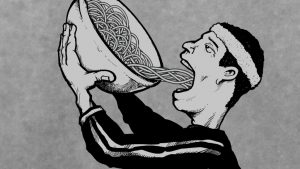Is carbohydrate loading an approach you should use to fuel yourself for race day? This blog post will help you answer that ever-pressing question about this hot topic in sports nutrition by outlining: 1) who should use this tactic, 2) what is carbohydrate loading, 3) how does it benefit athletes, and 4) how to appropriately carb load?
Who can benefit from carbohydrate loading?
Carbohydrate loading is an approach often used by endurance athletes with the ultimate goal of improving performance. This tactic is typically recommended for high-level athletes in prolonged exercise events lasting greater than 90 minutes.
What is carbohydrate loading?
In order to better understand carbohydrate loading, it is important to address the impact of carbohydrates on the body. After we eat and digest carbohydrates, they are broken down to glucose, which exists in our bloodstream and is stored in skeletal muscle and the liver as glycogen. When the body requires fuel for exercise, glycogen breaks down to provide glucose as an energy source for the body. In shorter duration exercise, your body’s glycogen stores are sufficient for performance. But your glycogen storage is limited! In high-level endurance activities, glycogen stores will be depleted resulting in fatigue. By increasing carbohydrate intake leading up to an event, athletes can ensure glycogen stores are ample allowing for a longer duration of activity before fatigue occurs.
Specific recommendations for endurance high-level athletes are to incorporate 10-12 grams of carbohydrate per kilogram of body weight per day for 36-48 hours before an athletic event. It is important to emphasize that this recommendation is for elite level athletes, and that other athletes may not require quite that amount of carbohydrate prior to an endurance race.
How does it benefit athletic performance?
If athletes are competing for prolonged times of >90 minutes at higher intensities, carbohydrate loading can maximize glycogen storage. Without appropriate glycogen storage athletes might experience hypoglycemia, fatigue, and/or a decrease in exercise intensity. Studies show carbohydrate loading can prevent those pitfalls by increasing duration of exercise, delaying fatigue, and improving performance.
How do you do it?

Carbohydrate loading is not simply one giant bowl of pasta before the race. The two meal plans below are outlined for an athlete of 145 lbs for one 24 hour period to help you discover how to carbohydrate load. The carbohydrate loading meal highlights addition of simple carbohydrates to meals and eliminates highly fibrous foods which may lead to gastrointestinal distress during a race.
Carbohydrate Loading Meal Plan: Athlete 145 lbs
10-12g/kg/day = 659-790 g CHO/day = ~49 CHO servings/day
| Meal
(loading) |
CHO (grams) | CHO (servings) | Food |
| Breakfast | 165g | 11 CHO | 1 cup of orange juice (2 CHO) + 1 bagel (4 CHO)+ 2 tbs Smuckers strawberry jelly (2 CHO) + 1 small apple (1 CHO) + ¼ cup of raisins (2 CHO) |
| Snack | 120g | 8 CHO | 1 20 oz Sports (2 CHO) +1 Nature Valley Granola Bar (2 CHO) + 1.5 cup of pineapple (2 CHO) + ½ cup of dried plaintains (2 CHO) |
| Lunch | 165g | 11 CHO | 2 cups of cooked Rotini pasta (6 CHO) + 1 small sweet potatoe (1 CHO) + 2 1 oz rolls (2 CHO) + 1 cup of applesauce (2 CHO) |
| Snack | 120g | 8 CHO | 1 20oz Sports drink (2 CHO) + 1 KIND granola bar (Oats and Honey) (2 CHO) + 1 large banana (2 CHO) + ¼ cup of craisins (2 CHO) |
| Dinner | 165g | 11 CHO | 1 20 oz Sports Drink (2 CHO) + 2 cups of cooked white rice (6 CHO) + 1 large baked potato (2 CHO) + 1 orange (1 CHO) |
*The meal outline above indicate carbohydrate recommendations only. The outline above does NOT include fat and protein recommendations. These macronutrients should also be included in your meals.
Regular Endurance Meal Plan: Athlete 145 lbs
6g/kg/day = 396 g CHO/day = ~26 CHO servings/day
| Meal
(regular) |
CHO (grams) | CHO (servings) | Food |
| Breakfast | 90g | 6 CHO
|
3/4 cup Old Fashioned Quaker Oats (3 CHO) + 1 small apple (1 CHO) + ¼ cup of raisins (2 CHO) |
| Snack | 60g | 4 CHO | 1.5 cup pineapple (2 CHO) + ½ cup of dried plaintains (2 CHO) |
| Lunch | 90g | 6 CHO | 1 cup of cooked Rotini pasta (3 CHO) + 1 small sweet potato (1 CHO) + 1 cup of applesauce (2 CHO) |
| Snack | 60g | 4 CHO | ¼ cup of craisins (2 CHO) + 1 large banana (2 CHO) |
| Dinner | 90g | 6 CHO | 1 cup of cooked white rice (3 CHO) + ⅔ cup of black beans (2 CHO) + 1 orange (1 CHO) |
*The meal outline above indicate carbohydrate recommendations only. The outline above does NOT include fat and protein recommendations. These macronutrients should also be included in your meals.
Recommendations
Please note the though the above recommendations are for competitive athletes, carbohydrates can be beneficial in your exercise regimen. Duration, intensity, exercise type, and athlete experience are important components to consider for nutrition recommendations. See a Sports Dietitian for a more optimal and individualistic nutrition plan for your next athletic event!
Trying to take your game to the next level or need help understanding, planning and executing on your nutrition strategy? It’s important that you have access to a team who can provide you with a comprehensive suite of nutrition strategies. The Human Performance team at Memorial Hermann IRONMAN Sports Medicine Institute are dedicated to an athletes performance both on and off the field.
To get in contact with a sports dietitian or to schedule an appointment, visit their website.
Written by: Keri Carpenter, MPH
Reviewed by: Brett Singer, MS, RD, CSSD, LD